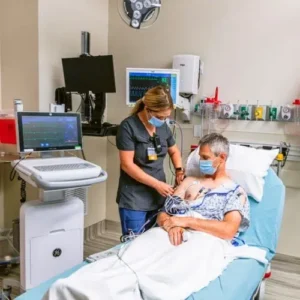
As people get older, medical conditions get more complicated. From navigating multiple medications to dealing with chronic illness and mobility, older adults need care that is coordinated, well-planned, and according to the aging brain and body.
That leads to the important question: What kind of doctor is most suitable for older patients?
It is not necessarily easy to respond, but knowing the most important professions in geriatric care will make it possible for elderly people—and their families—to make the correct decision.
Geriatricians: Specialists in Elderly Care
A geriatrician is a medical physician who concentrates in caring for individuals 65 and older. Geriatricians learn about how aging occurs, how various health conditions impact one another, and how medications can be managed in the safest manner. Geriatricians also specialize in keeping seniors independent, of quality of life, and functioning for as long a period of time as possible.
What Makes Geriatricians Unique
- They deal with the entire person, rather than an individual disease.
- They take into account the impact of aging on daily function, memory, nutrition, and mental health.
- They prescribe more than one drug to reduce the likelihood of side effects or adverse drug interactions.
- They assist frail patients, fall-risk patients, incontinence patients, cognitively impaired patients, and emotionally distressed patients.
- They integrate care among several specialists and caregivers.
Geriatricians are more holistic in their care than most specialists, and therefore an excellent option for older adults with multiple or complicated issues.
When to See a Geriatrician
Not all older adults require a geriatrician immediately. Most older adults are active and healthy into the 70s or 80s and continue to visit their regular physician. However, it is time to see a geriatrician if:
- The patient is coping with more than one chronic condition (such as diabetes, arthritis, and heart disease).
- There are issues of memory loss, confusion, or early dementia.
- Medications are inducing side effects, or the medication schedule is lengthy and complicated.
- The patient tends to fall frequently or has a balance issue.
- They require assistance with activities of daily living, including bathing, dressing, or eating.
Geriatricians are of use when caregivers at home feel overwhelmed and require professional guidance as well.
What If a Geriatrician Isn’t Available?
In some places, particularly rural or smaller towns, geriatricians might not be readily available. In that case, don’t panic — other medical professionals can still deliver great care for the elderly.
1. Primary Care Physicians (PCPs)
The majority of older individuals visit a family physician or internal medicine specialist for general medical care. These physicians usually have lengthy histories with their patients and are knowledgeable about their medical history.
A few PCPs are well geared to handle older individuals, provided they possess knowledge in the management of chronic conditions and liaison with experts. They are also in a position to refer the patient to a geriatrician if needed.
2. Geriatric Nurse Practitioners
Geriatric nurse practitioners are able to evaluate the physical, mental, and emotional status of seniors. They typically work in collaboration with physicians to coordinate multifaceted care plans and assist family caregivers.
3. Other Specialists
Depending on the health of a senior, the care team may also consist of:
- Neurologists – memory problems, dementia, Parkinson’s, and stroke recovery
- Cardiologists – high blood pressure, heart failure, or arrhythmia
- Endocrinologists – diabetes or thyroid disease
- Psychiatrists or psychologists – depression, anxiety, or psychiatric
- Orthopedic specialists – fractures, joint pain, or arthritis
- Urologists – prostate or urinary conditions
These professionals may have special care, but a geriatrician or primary doctor typically remains the focal point of overall health care.
The Need for Coordinated Care
Older adults typically have more than one health provider at the same time, and that can create confusion, particularly about medications or treatment. That is where coordinated care is helpful.
Whomever is coordinating the care, be it a geriatrician, family doctor, or nurse practitioner, they should collaborate to:
- Keep records current
- Track medications and monitor side effects
- Prevent conflicting therapies
- Assist with the daily needs and goals of the elderly
This is typically when geriatric care teams are able to intervene. In some hospitals and clinics, geriatricians collaborate with social workers, physical therapists, dietitians, and pharmacists to provide comprehensive care to elderly patients.
Don’t Forget Preventive Care
No matter the kind of doctor, preventive care is a significant part of elderly health. Check-ups have the ability to catch conditions before they become severe and encourage healthy aging. Preventive care may include:
- Blood pressure and cholesterol screening
- Cancer screening
- Vaccines (such as flu, pneumonia, and shingles)
- Fall risk evaluations
- Psychiatric screenings
- Vision and hearing examinations
A good doctor will keep the older adult active in their own medical care and adjust their treatment according to changing needs.
Closing Remarks
So who is the ideal physician for elderly patients? Ideally, a geriatrician. If not, however, a family doctor, internist, or geriatric nurse practitioner with experience in elder care can be a big help — and especially when working together with specialists as needed.
The solution is to locate one caregiver who will listen, be sensitive to the subtleties of aging, and be able to guide the patient and family with sensitivity and understanding.
A trusted GP for elderly patients can be a key part of that support system. A perfect care team can partner with aging and change, enabling seniors to experience health, independence, and dignity for many years to come.







